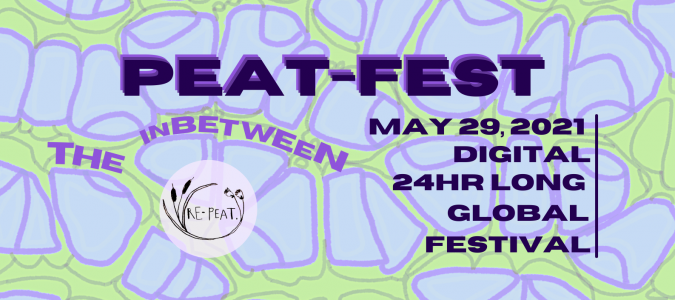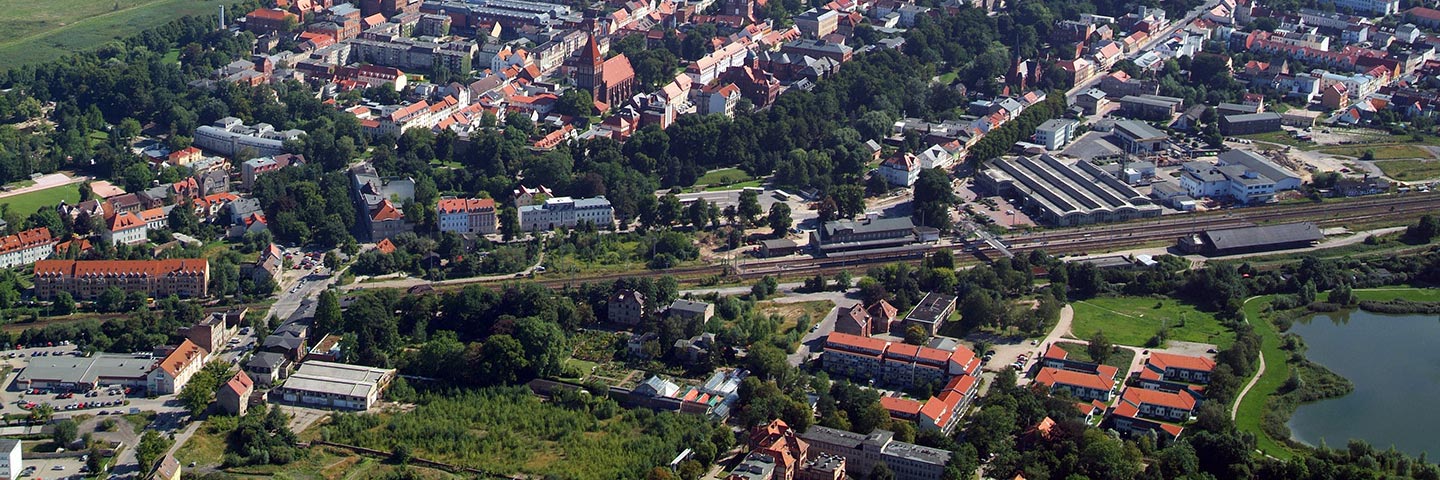News/All pieces
New meat atlas takes a look at the peatlands
Why “moor milk” is bad for the climate
7/1/2022 The CO2 footprint of one liter of “moor milk”, whether organic or not, is five times higher than that of milk from other pastures – how does that work? Sabine Wichmann (GMC) explains the invisible climate damage from the connection between animal husbandry, food production and soil in the current meat atlas: Drained moorland and used for agriculture release the carbon that is preserved when wet into the atmosphere as CO2. These emissions cause high levels of climate damage and are part of the carbon footprint of food. However, this is not yet apparent to consumers - labeling would help here. In Germany, these peatlands make up only seven percent of agricultural land, but their drainage is responsible for 37 percent of greenhouse gas emissions from agriculture and agricultural land use. The situation is similar across the EU.
Organic soils in national inventory submissions of EU countries
New report takes a critical look
21/12/2021 EU member states differ a lot in the quality of their mapping of organic soils and in the estimation of associated emissions – Nina Martin and John Couwenberg write in the new issue of the Proceedings of the Greifswald Mire Centre Organic soils in national inventory submissions of EU countries. The report takes a critical look at UNFCCC greenhouse gas reporting on emissions from agriculturally used organic soils for all EU countries (plus the UK) and presents a comprehensive analysis based on inventory data of the countries published in 2020. Where shortcomings in reporting were identified, it makes suggestions on improvements, including consistent use of the IPCC Wetlands Supplement (IPCC 2014). It also provides concrete area data and corrected numbers. Numbers have been compiled for all EU countries and available in a separate table (xls file).
For all on #WorldSoilDay:
Beautiful peatland illustrations!
05/12/2021 Complex, comprehensible and beautiful - with the help of illustrator Sarah Heuzeroth, the Greifswald Mire Centre has put peatland into the picture three times over - peatland intact, drained and in a future use in paludiculture. The illustration of the intact peatland shows how peat forms under the exclusion of water, how much carbon can be stored in this process, which animals live in the wet habitat and, simply, how beautiful it is. How much CO2, on the other hand, originates from drained peatlands used as grassland or arable land, and what size is the footprint of the associated dairy products, is depicted in the illustration of drained peatlands. A third illustration shows what peatlands in paludiculture can offer: Area for human land use, new habitat for rare, specialised peatland plants and animals, and a reactivated carbon store for more climate protection. The illustrations can be downloaded free of charge from the Greifswald Mire Centre website. To ensure that many people interested in peatlands can use the illustrations, they are also available in English and will soon be available in French, Polish, Russian and Spanish. The German version of the three illustrations combined is also available as a poster. In addition, the Greifswald Mire Centre and Sarah Heuzeroth developed four motifs as postcards. Besides sedge warbler, bulrush and sphagnum moss, a peat profile shows which plant remains can be found in which peat layers - including depth and time scale. The material is available to all interested licensed under Creative Commons CC BY-NC-ND.
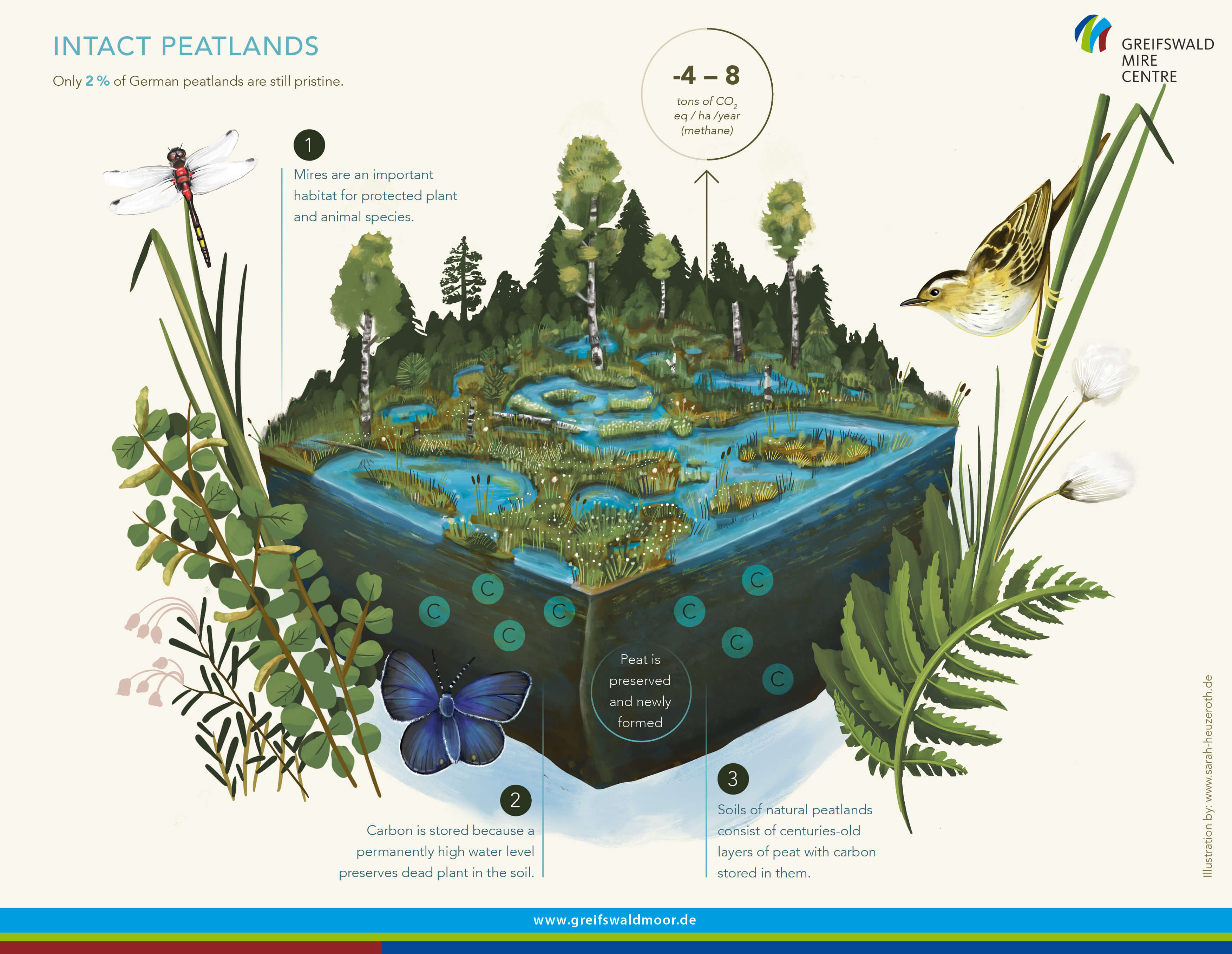
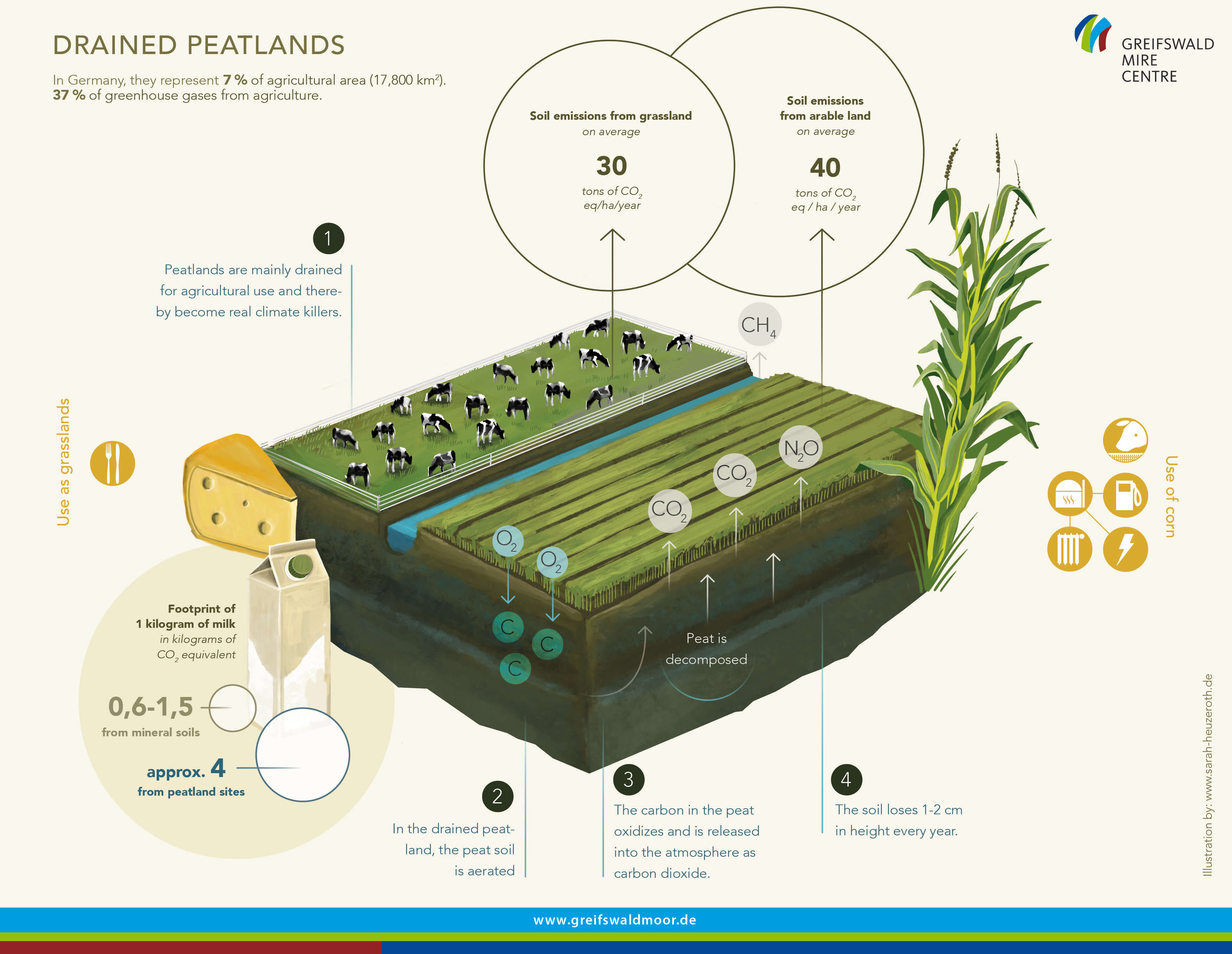
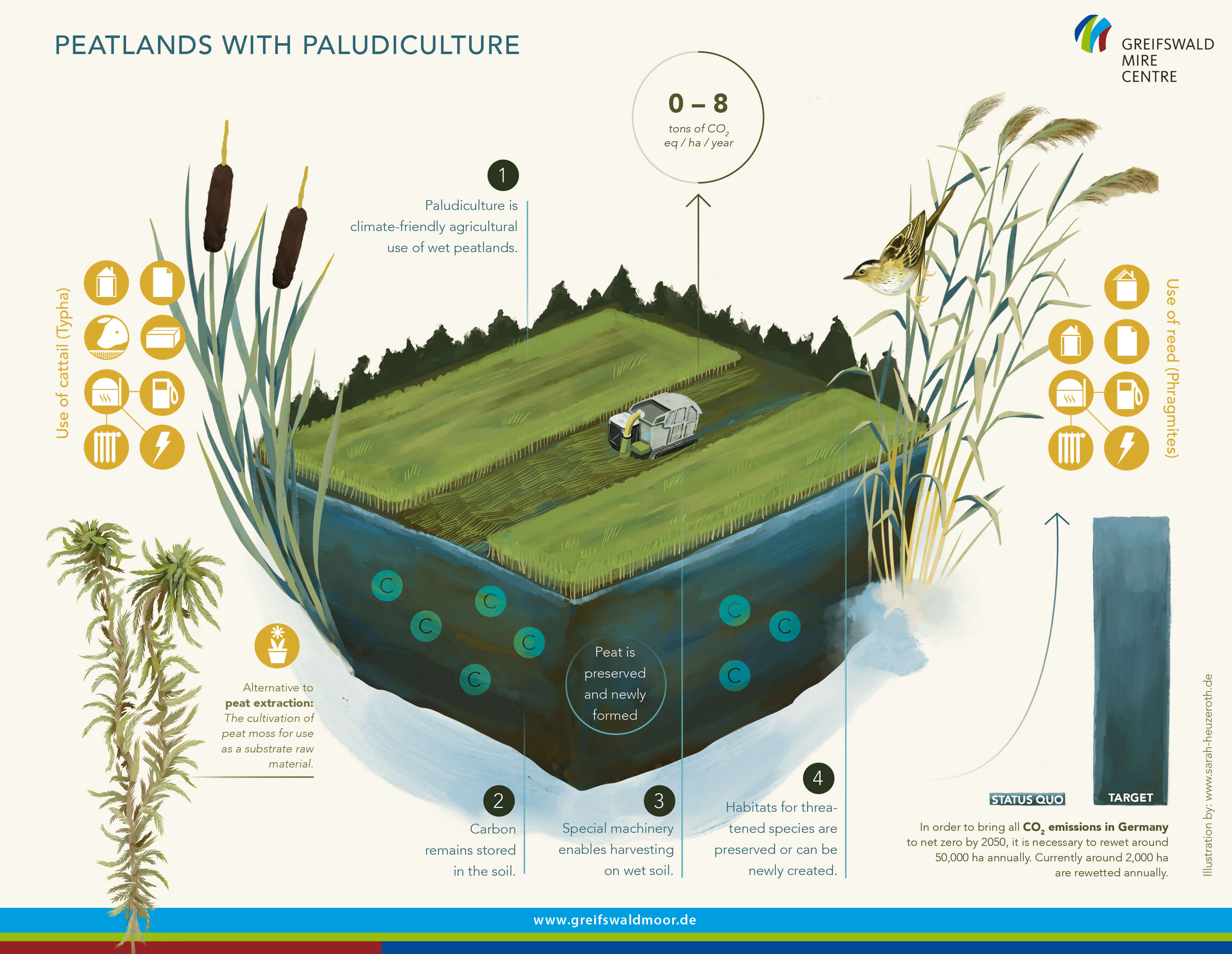
How to put peatlands into CAP Strategic Plans
Recommendation in new position paper
26/11/2021 The title says it all – Michael Succow Foundation, partner in the Greifswald Mire Centre, issued a new position paper Opportunities for Peatlands and Paludiculture in the EU Common Agricultural Policy (2023-2027) - Recommendations for EU Member States for their CAP Strategic Plans. It urges EU Member States to make paludiculture eligible for payments either direct, in eco-schemes or other. The Common Agricultural Policy (CAP) as the EU’s largest public funding mechanism could thus be used to make a change for climate and ecology within the next five years. The CAP strategy must not be adapted neglectfully and maintain damaging business-as-usual practices since within the EU emissions from drained peatlands account for c. 5% of its total greenhouse gas emissions. In paludiculture they offer a basis for a circular bioeconomy, for future resilient and profitable business models for farmers and landowners, and contribute to climate protection, biodiversity, water security, flood management and fire protection.
Peatland pavilion, peatland map, Michelle...
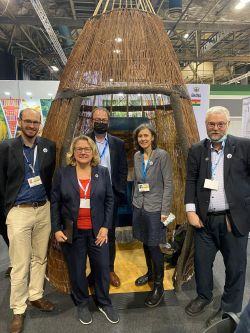
Without the protection and rewetting of peatlands, the global climate crisis cannot be countered. Peatland experts from Greifswald were able to make this clear to delegates, politicians, celebrities, practitioners and scientists from all over the world at the two-week World Climate Conference (UNFCCC COP26) from 31st October to 12th November in Glasgow. They are optimistic that the new knowledge about these climate protection potentials will now be incorporated into the policies and actions of many countries.
At the World Climate Conference in Glasgow, peatlands were presented for the first time in a separate pavilion organised by the Succow Foundation and the Greifswald Mire Centre together with the UN Environment Programme, IUCN UK Peatland Programme and other members of the Global Peatlands Initiative. The world peatland map developed at the Greifswald Mire Centre attracted visitors directly at the entrance. The twelve-day hybrid lecture programme offered a comprehensive overview of peatland science, protection and policy on all continents. Prominent visitors such as the former First Lady of the United States Michelle Obama, the Executive Director of the UN Environment Programme Inger Andersen, numerous ministers and other government representatives, as well as known environmental journalists such as Chris Packham of the BBC came by.
"Hundreds of delegates and observers to the Climate Change Convention looked at our huge peatland map. Many countries don't even know they have peatlands. Their representatives are taking away from Glasgow that peatlands are important for climate protection. Our presence here was as effective as peatlands are as carbon sinks." said Dr. Franziska Tanneberger, Director of the Greifswald Mire Centre. A special highlight was a water drop made of reeds and willow built by peatland experts from the University of East London, in which a sofa was placed - probably the most popular seat in the whole pavilion. This construction was an impressive eye-opener for many visitors as to what building materials from paludiculture can be used for.
The Succow Foundation and the Greifswald Mire Centre as a whole organised many events in the hybrid Peatland Pavilion e.g. "Organic Soils and Peatlands in the Baltic States: Greenhouse Gas Mitigation Measures and Paludiculture" on 8th November, "Peatland Protection in Germany" and "Peatlands in the Nile River Basin as a Nature-Based Solution" on 10th November, and the launch of a European Peatland Protection Initiative on 12th November. The Greifswald Mire Centre - with a large format printout on site and Dr. Alexandra Barthelmes as speaker in Greifswald - presented the world peatland map on 9th November.
The virtual Peatland Pavilion, which is in English, will continue to be available online to interested parties with multifaceted information on peatlands worldwide even after the World Climate Conference.
Milestone for peatland climate protection in Germany
Funding decisions for BMU paludiculture pilot project in MV
3/9/2021 Coinciding with the fieldday on paludiculture, Jochen Flasbarth, the State Secretary of the Federal Ministry for the Environment, Nature Conservation and Nuclear Safety (BMU), handed over funding decisions for the first of several new projects on paludiculture in Germany. The funding recipients are the University of Greifswald and the Landgesellschaft Mecklenburg-Vorpommern, which will receive the majority of the funding (12.6 million euros). As part of the pilot project, it is planned to raise the water level of two previously drained peatland areas in M-V and thus largely reduce greenhouse gas emissions from these areas. In the polders Bargischow Süd near Anklam and Sandhagen near Friedland, the cultivation of paludiculture will be tested and investigated on several hundred hectares. A milestone for peatland climate protection in Germany!
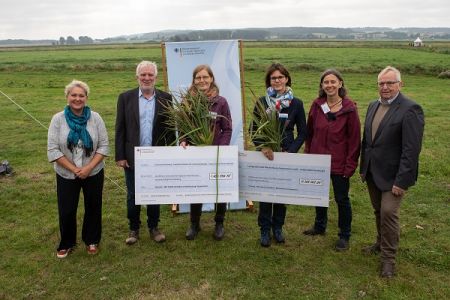
How does it work with the cattail?
Field day on paludiculture
3/9/2021 At the public field day at the 10 ha trial area for cattail cultivation, about 160 local residents, farmers, scientists, politicians and representatives of the press visited us. On a tour with eight stations, we showed hands-on research and implementation: Experiences and studies on the establishment of the area, cultivation of cattail, water management, harvesting and utilisation of the biomass as well as on the importance of wet peatlands for the climate and biodiversity. In addition to Dr Till Backhaus, Minister of Agriculture and Environment M-V, and Dr Arif Havas Oegroseno, Ambassador of Indonesia to Germany, the State Secretary of the Federal Ministry for the Environment, Nature Conservation and Nuclear Safety (BMU), Jochen Flasbarth, also visited the field day.
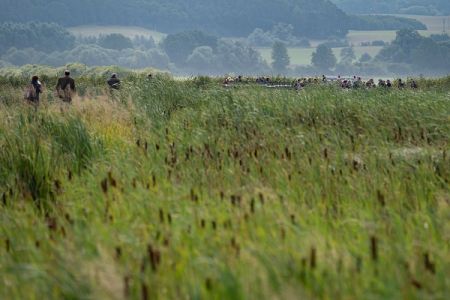
The German Environmental Award 2021...
goes to peatland scientist Hans Joosten!
27/8/2021 This year, the German Federal Environmental Foundation for the Environment (DBU) is honouring peatland scientist Prof. Dr. Dr. h.c.. Hans Joosten with the German Environmental Award, one of the most highly endowed awards of its kind in Europe. Congratulations from the Greifswald Mire Centre!
Joosten himself likes to sum up his decades of research and commitment with #Moormussnass! With character, passion and the occasional morsel of peat, he has contributed to publicising the importance of wet peatlands for global climate protection. Joosten, who describes "everything related to peatlands" as his hobby, shares the prize endowed with 500,000 Euros with the internationally renowned scientist Prof. Dr. Katrin Böhning-Gaese. Both will be awarded the prize by Federal President Frank-Walter Steinmeier on 10th October in Darmstadt. Joosten intends to use the prize money to expand the peatland library PeNCIL - the world's largest peatland library with around 25,000 publications based at the Greifswald Mire Centre - into a global knowledge and cultural centre on peatlands.
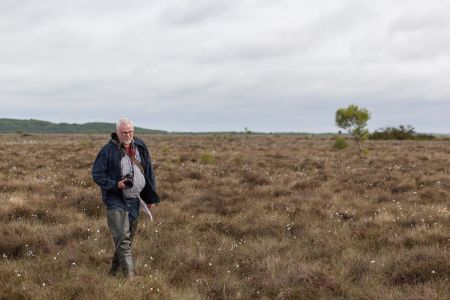
Removing barriers to peatland climate protection
New information paper on conversion to paludiculture
30/6/2021 Paludiculture with wetland species such as reeds, cattail and peat mosses is a good way to continue to use peatlands productively after water levels have been raised for peatland climate protection. In order to establish such permanent crops on previous grassland, the regulations on grassland conservation must be observed. Any conversion of permanent grassland into paludiculture must be approved. In addition, there is an obligation to establish new grassland (on arable land) as replacement. This obligation to quantative grassland maintenance is an obstacle to the implementation of paludiculture and should be reconsidered for peat soils.
In the MoKli project, there was an expert discussion with representatives of authorities of the federal states rich in peatlands. They discussed background to grassland protection, differences between mineral and peat soils, the application of existing exemption regulations and possible new special regulations to reduce the obstacle. The new information paper Guidelines for grassland conservation when converting to paludiculture (German only) summarises the legal framework and the main points of discussion.
A current opportunity to improve framework conditions for conversion of drainage-based peatland use to paludiculture is offered by the legal framework for the new funding period of the Common Agricultural Policy from 2023 onwards. While no special provision for paludiculture has been included in the Conditionalities Act in Germany, which regulates minimum standards such as permanent grassland maintenance, the more detailed legal regulation accompanying the Act could allow for the waiver of establishing replacement areas. A major obstacle to paludiculture and voluntary peatland climate protection would thus be removed.
24h online Peat-Fest 2021
GMC’s contributions at 29th May
29/05/2021 At the 24h online Peat-Fest 2021 of the group RE-PEAT Hans Joosten is giving a 2h literary session on “Selma Ruoff: The mind of a scientist, the soul of a poet” at 21:30-23:30 CEST. Ruoff was an in-between between Russia and Germany, science and poetry, heaven and hell, gulag and freedom. Hear about the peatlands she studied, the people she met and the life she lived.
The session “Reimagening the #CAP” is offering future-minded perspectives and alternatives to current plans of agricultural policy within the EU. In the panel discussion at 14:15-15:15 CEST: Sophie Hirschelmann from Greifswald Mire Centre, Harriet Bradley from Birdlife, Silvia Contin from Good Energies Alliance and Sommer Ackerman from Withdraw the CAP. Tickets are free, but donations welcome when signing up for the event.
The Greifswald Mire Centre is pleased to contribute to the Peat-Fest again. First launched in 2020 it is the original and only 24 hour online festival completely dedicated to peatlands. The organiser RE-PEAT is a youth-led group using collaboration, education and a process of re-imagining to shift the peatland paradigm and push for peatland restoration and preservation.
